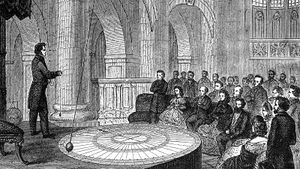Difference between revisions of "Foucault Pendulum"
Tom Bishop (talk | contribs) |
Tom Bishop (talk | contribs) |
||
| Line 15: | Line 15: | ||
|align=left | |align=left | ||
|quote=''“This ''pendulum'', modern scientists tell us, affords a ''visible'' proof that we are living on a whirling globe, which, according to a ‘Work on Science’ now before me, is spinning upon its so-called axis at the rate of over 1,000 miles an hour at the equator; and, in addition to other motions, is rushing on an everlasting tour round the sun (the diameter of which is said to be 813,000 miles, and its weight 354,936 times greater than the earth from which it is said to be about 93,000,000 miles distant,) at the rate of over 1,000 miles per minute. Now to prove that the earth really has these motions a pendulum is suspended at the show; the showman sets motion, and bids the gaping world of thoughtless men and women to ‘behold a proof’ that we are living on a whirling globe which is rushing away through space!”' | |quote=''“This ''pendulum'', modern scientists tell us, affords a ''visible'' proof that we are living on a whirling globe, which, according to a ‘Work on Science’ now before me, is spinning upon its so-called axis at the rate of over 1,000 miles an hour at the equator; and, in addition to other motions, is rushing on an everlasting tour round the sun (the diameter of which is said to be 813,000 miles, and its weight 354,936 times greater than the earth from which it is said to be about 93,000,000 miles distant,) at the rate of over 1,000 miles per minute. Now to prove that the earth really has these motions a pendulum is suspended at the show; the showman sets motion, and bids the gaping world of thoughtless men and women to ‘behold a proof’ that we are living on a whirling globe which is rushing away through space!”' | ||
| − | |source=The Romance of Science | + | |source=The Romance of Science}} |
| Line 46: | Line 46: | ||
… If the earth had the terrible motions attributed to it, there would be some sensible effects of such motions. But we neither feel the motion, see it, nor hear it. And how people can stand watching the pendulum vibrate, and think that they are seeing a proof of the motions of the earth, almost passes comprehension. They are, however, brought up to believe it, and it is thought to be ‘scientific’ to believe what the astronomers teach.”' | … If the earth had the terrible motions attributed to it, there would be some sensible effects of such motions. But we neither feel the motion, see it, nor hear it. And how people can stand watching the pendulum vibrate, and think that they are seeing a proof of the motions of the earth, almost passes comprehension. They are, however, brought up to believe it, and it is thought to be ‘scientific’ to believe what the astronomers teach.”' | ||
| − | |source=The Romance of Science (8-10) | + | |source=The Romance of Science (8-10)}} |
==Mach's Principle== | ==Mach's Principle== | ||
Revision as of 02:24, 28 August 2018
The Focault Pendulum is a famous experiment which is alleged to give simple, direct evidence of the earth's rotation. Introduced in the 1851, Léon Foucault claimed that the motions were proof the earth's rotation. Today Foucault Pendulums are popular displays in science museums and universities.
A common criticism of the Focault Pendulum is to point out that when the pendulum experiment has been recreated and put into motion, the pendulum has often been seen to rotate in excess, in shortness, or in an opposite direction from the direction it should have traveled according to theory. At times it does not rotate at all. Those scientists who have repeated the experiment have freely admitted that “it was difficult to avoid giving the pendulum some slight lateral bias at starting.”
In the unmotorized Focault Pendulum experiment the pendulum is generally unpredictable, and because of air resistance, the unmotorized pendulum will only move for a short while before needing to be reset. In motorized Focault Pendulums, as seen in museum exhibits, it is the repetitive machinery which imparts the repeating lateral bias that creates the regular results seen for the museum's visitors.
Thus, the experiment is entirely invalid as a demonstration of diurnal rotation. That a pendulum on a string can rotate as it swings back and fourth has more to do with the initial conditions which set it into motion than the supposed rotation of the earth.
Lady Blount provides the following:
|
Non-Uniform Variation
Samuel Birley Rowbotham informs us that the variation of the pendulum is often non-uniform and unpredictable:
|
The Wrong Direction
The Focault Pendulum is often seen to move in the wrong direction entirely. See the following quotes:
|
|
Mach's Principle
One alternative explanation that has been suggested by those who do accept the Focault Pendulum is Mach's Principle. Mach's Principle explains that if the earth was still and the all the stars went around the Earth then the gravitational pull of the stars would pull the pendulum. As Mach said "The universe is not twice given, with an earth at rest and an earth in motion; but only once, with its relative motions alone determinable. It is accordingly, not permitted us to say how things would be if the earth did not rotate."

